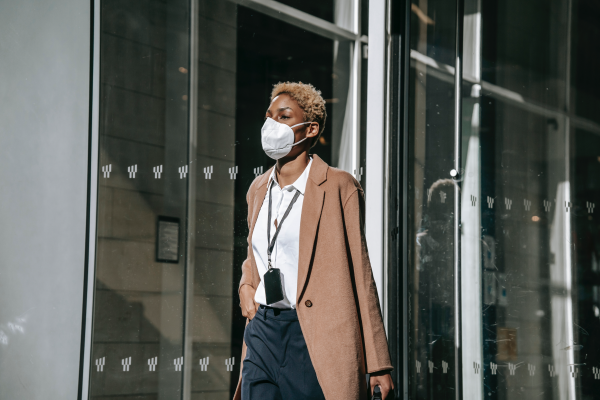With plans to return to the office changing through prolonged uncertainty, some simple tools can help us deal with the shift back to the workplace.
The video embedded below was produced by the Northeast Chapter of the Association of Corporate Counsel. With over 1,400 members in its Northeast Chapter covering Massachusetts and four other states, the ACC is a global legal association that promotes the common professional and business interests of in-house counsel who work for corporations, associations, and other organizations through information, education, networking, and advocacy. The Northeast Chapter of the ACC offers over 40 educational, professional development and networking events throughout the year. These programs and events offer members ample opportunity to meet, learn and engage with other in-house legal professionals and the chapter’s respected sponsors.
Transcript
TRACEY MEYERS, PSY. D., LCL MA STAFF CLINICIAN
My name is Tracey Myers. I’m a licensed clinical psychologist and I am a staff clinician at Lawyers Concerned for Lawyers in Massachusetts.
Today I’m going to be talking about reboarding during uncertain times, and highlight some of the recent data that’s come out about the workforce and how the workforce has been affected by the pandemic, and then talk about how lawyers and law firms and lawyers working in the public sector can really help each other to reboard or to navigate these times with flexibility and care. So there was a recent Gallup poll that came out just last week, indicating that the state of the global workplaces has been in crisis. The effect of a pandemic has included mental health issues. Most people that responded almost half said that they were experiencing anxiety and stress, about 25% of people across the world, surveyed said that they were experiencing anger, and daily sadness about 25%. So from these numbers alone we can see across the world people are struggling with mental health challenges as a result of the pandemic. That’s probably not surprising I think to many of us, and to lawyers in particular who have already been struggling with anxiety, depression, anger management challenges.
But what was really interesting in the Gallup report that I think applies to lawyers now, is really other indicators of challenges and one is employee engagement. This Gallup poll found that only 20% of employees feel engaged with their employer, meaning that people are feeling more and more disengaged and less and less invested in the workplace, which makes sense. If we’ve been working virtually or in a hybrid model, we’re feeling less supported by our colleagues and we may not even feel like we have people we can go to.
Other things that are going on in the world of course it impacted the global workplace as well, and people are showing the signs of that as well. There was a lot less positive views about government, about society as a whole. People were feeling less engaged and more disillusioned.
So what does that all mean in terms of reboarding? So first of all it’s really important to recognize where the workplace is, if we come up with lots of strategies to come back to the workplace and we don’t acknowledge the toll that it’s taken on us, we’re going to find that we have a lot more distress in the early reboarding reentry stages.
So number one is recognize that people are struggling. So if you’re an employee, you’re working in a law firm or, or you’re working in a public sector, just recognizing and acknowledging what’s happened, where are you at in terms of your worry, your stress, your anxiety. And if you’re an employer, recognizing that your workforce coming back, or that might be coming, you know back for a hybrid schedule, they’re not the same as a workplace that left before, particularly females. So female lawyers have really been struggling with the work life balance, more women than ever wanting to leave the field of law.
So we want to first understand that people are coming in a fragile state. And so because of that we want to really ensure that people are developing a toolkit of resources, when they return.
So first it’s just recognizing that when they return, people have all different views about coming back. Some people are anxious to come back to work. Some people are very afraid to come back to work. And many of us are in between right, maybe hybrid, maybe if the numbers are down with a Delta variant right so there’s lots of different views. And when we have different views it’s really important first of all to consider, what do I personally need what would, what would help me, as I think about reboarding?
So I like to use self reflection as one of the tools, meaning looking at my anxiety level, stress level, my schedule, and see right away — Am I able to balance right now, or am I able to balance if I’m returning to work?
So I often as a psychologist will recommend people do a self report screening like a perceived stress test where you can really look and see how stressed am I right now? How is my work life balance? So we want to really focus in on that. We’ve talked about that in the past, like it’s an extra thing like it’d be great to have a work life balance. But we know now considering where we are struggling with in the workplace that it’s a mandate to actually have work life balance for employee well being. So looking at our stress level and if we are stressed, what are the resources we can use?
In a previous video we did a mindfulness practice, so we know mindfulness practices, breathing, yoga, body-based practices can help with stress. Sometimes talking to a therapist you know, at LCL, we have consultations available for lawyers, law students, judges where we can meet one on one and really talk through where is your stress level, how are you coping, here are some skills. So sometimes that can be very effective. For some folks, it may be longer term psychotherapy, finding a referral, so that you can really work with someone on a regular basis. Support groups, you know, we do a bunch at LCL, there are a lot of different support groups, places where people are going together as peers to work on feeling more connected. So taking care of the emotional part of ourselves as part of the well-being process as we reboard, that’s going to be really important.
Some other parts that I want to just offer to think about is also what makes us feel vital in our job. The Gallup reports show that people are feeling disengaged, so how as an employee or an employer can we feel more engaged? What can get us to feel passionate? Research shows that the more that we’re giving back and the community, whether we’re doing volunteer work, pro bono work, whether we’re helping in a food pantry, whether we’re donating time or mentorship, that can make a difference. And we also need that in return. So that connection to the community and feeling value, really important.
Physical well-being — so if we’re going back to work, what does our sleep schedule look like? How healthy is our diet and exercise schedule? So that’s another key component to well-being as we reboard.
And then other domains like connection. And this is one of the things we’re missing, and I think many of us don’t realize it until either we start to reconnect with people, or we realize we’ve been feeling lonely or, you know, distant from other folks at work. So how can we reconnect during the pandemic in this ongoing reboarding process so that we are getting some more social connection. It can feel so good to have an in-person visit with somebody as long as people feel safe, right.
And the final piece around reboarding is safety and security. We want to make sure that people feel safe. If people don’t feel safe that foundation of safety, it’s nearly impossible to feel good about your job. So that piece of always looking at well what would feel most safe, what allows me to do my job but allows me also to feel safe and stable. So that requires, I’d like to call it like a soft landing. So folks are going back part-time or they’re going in a hybrid model, soft landing has a little bit more flexibility to change and navigate, to listen when people are feeling like there may be some safety concerns, and also to be able to really recognize in yourself like I have too much anxiety to go full-time. So I’m going to take some small steps and titrate back in. Me personally, I went to see my office, but I’ve been hired during the pandemic and I went for the first time last week to actually see the office where I was hired to work in, and I felt actually more engaged when I did that. And so being able to, at your own pace, when you feel ready, start making those movements can feel empowering.
So these are just a few things to consider during this reboarding process. I understand that we’re going to continue to navigate this, and we’ll continue to have more and more information as time goes on, from a psychological perspective of how to best help each other during this difficult time. For resources, like, I spoke about earlier for talking to a clinician or a support group, please feel free to contact us at Lawyers Concerned for Lawyers, we can also assist in getting a referral to see someone in the community. And again, we’re a resource for lawyers, law students, and judges here in Massachusetts. So thank you so much and look forward to seeing you again.
Related:
Amy Cuddy with Brené on Pandemic Flux Syndrome (Dare to Lead with Brené Brown, September 2021)
Reconfiguring Legal Workspace in the New Normal with Hybrid Remote Schedules (Mass LOMAP, June 2021)
Free & Confidential Consultations:
Lawyers, law students, and judges in Massachusetts can discuss concerns with a licensed therapist, law practice advisor, or both. Find more on scheduling here.




